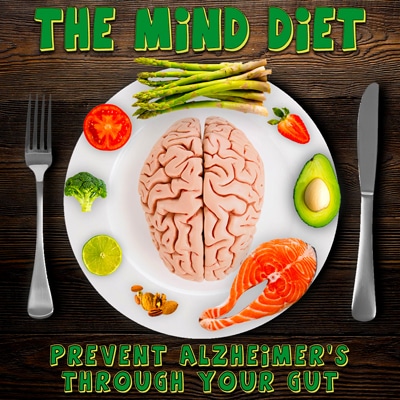The MIND Diet: Prevent Alzheimer’s Through Your Gut
Wrinkles, memory loss, weight gain, and frailty are all words we dread as we age.
All of them get chalked up to being a normal part of getting old.
It actually isn’t normal.
Most of these problems stem from an unhealthy diet and dehydration.
One of the scariest diseases about growing old is dementia.
Forgetting where your car keys are is one thing, but forgetting that the girl standing in your kitchen is your daughter is a whole different issue.
Can you really prevent that heartbreak by your diet?
Basics of Alzheimer’s Disease and Dementia
Most times, dementia and Alzheimer’s disease are used interchangeably. While they aren’t exactly the same thing they are related.
Dementia is more of a coverall term for diseases that affect your cognitive abilities so drastically that you are unable to perform normal daily tasks.
There are several different forms of dementia.
They include:
- Alzheimer’s Disease
- Lewy Body Dementia
- Frontotemporal Dementia (Early-Onset Dementia)
- Vascular Dementia
- Mixed Dementia
In this article, we will be focusing on Alzheimer’s disease since it is the most commonly diagnosed form of dementia at 60-80%.
Symptoms of Alzheimer’s disease include:
- Memory loss
- Impaired cognitive function
- Decreased capabilities to speak and reason clearly
- Attention span problems
- Mood swings
- Misplacing items in abnormal spots
- Outbursts of anger and frustration
While this disease has a good bit of knowledge about what happens to the brain, it is extremely hard to track stages and classify symptoms to different stages without more advances in medical technology.
The biggest physical brain changes in patients with Alzheimer’s disease are:
- Formation of plaques from amyloid-beta proteins
- Neurofibrillary tangles formed by tau-protein hyperphosphorylation
- Neuron and synapse loss
- Brain atrophy
Basically, these plaques and tangles attach to your neurons and cause them to malfunction leading to all of the terrible symptoms that accompany Alzheimer’s disease.
So where do these plaques come from?
Cholesterol is the main precursor to plaque formation.
You know how your doctor says you need to lower your cholesterol for your heart health — to avoid plaques from depositing in your arteries?
Well, it’s the same for your brain health.
It was found that middle-aged people who suffer from high total blood cholesterol actually have a much higher chance of developing dementia later in life.
Another thought on the development of Alzheimer’s disease is blood-brain barrier (BBB) dysfunction.
Both oxidative stress and chronic inflammation can decrease the integrity of your BBB.
Chronic inflammation typically stems from a leaky gut, so by protecting your gut you can actually be preventing Alzheimer’s disease.
All of these things can be controlled through your diet.
Preventing Alzheimer’s Disease Through Your Food
Now that you know a little background on Alzheimer’s disease, you might already know how your diet might affect your risk.
Dietary Fatty Acids
Good fats:
- Monounsaturated
- Polyunsaturated
- Omega 3
Bad fats:
- Saturated
- Trans
You need good fats in your diet to help you with the absorption of essential nutrients and vitamins. Sticking to plant-based oils can help you to get them into your diet.
Excessive bad fats — like in the Western diet — can increase your cholesterol levels and cause destruction to your BBB through inflammation.
Polyphenols and Carotenoids
Polyphenols are compounds in fruits and vegetables that give them their vibrant colors but also supply your body with antioxidant and other effects.
Polyphenols help to fight inflammation and oxidative stress — which are two main factors in Alzheimer’s and other diseases.
Flavonoids
Flavonoids are found at high quantities in most berries.
Some positive effects flavonoids have on Alzheimer’s disease include:
- Improve learning and memory capabilities in the aging brain
- Slow down cognitive decline
Resveratrol
Resveratrol is the polyphenol found in red wine that gives it cardioprotective qualities.
Resveratrol was also found to have properties that protect your brain from neurodegeneration.
Curcumin
Curcumin is found in turmeric.
Curcumin was found to reduce the development of amyloid beta plaques AND reduce plaques that have already been formed.
Carotenoids
Carotenoids are a class of antioxidants — like polyphenols.
Carotenoids usually give an orange or red color to the produce they inhabit (i.e. carrots, tomatoes, etc.)
Carotenoids help to slow down and potentially prevent the development of Alzheimer’s disease by:
- Reducing oxidative stress
- Preventing amyloid beta plaque production
- Decreasing neurofibrillary tangle formation
Vitamins and Minerals

To help with the prevention and reversal of Alzheimer’s disease, you’ll want to load up on your vitamins and minerals.
Some of the main vitamins you’ll want to make sure you’re getting enough of include:
- Vitamin B
- Vitamin C
- Vitamin D
- Vitamin E
Some minerals to make sure you’re getting enough of include copper and iron.
Having a diet that supports all of these vitamins and minerals is crucial for cognitive health.
The MIND Diet: Nourishing Your Brain and Gut
The MIND diet is a pretty new diet, so research on it is just in its infancy.
The MIND diet takes the best brain-boosting foods from two different diets to make a superdiet for your brain.
The diets that the MIND diet is based on are:
- The Mediterranean Diet
- The Dietary Approaches to Stop Hypertension (DASH) Diet
Both diets focus on eating mostly plant-based foods and limiting unhealthy fats.
The MIND diet took it a step further and specified certain foods from each group and how many times to eat them throughout the week.
The 10 good foods that you will focus on are:
| Foods | Serving |
| Whole Grains | At least 3/day |
| Leafy Greens | At least 6/week |
| Other Vegetables | At least 1/day |
| Berries | At least 2 /week |
| Poultry | At least 2/week |
| Fish | At least 1/week |
| Beans | More than 3/week |
| Nuts | At least 5/week |
| Olive Oil | Use as your primary oil |
| Wine | 1/day |
The 5 foods you need to limit are:
| Food | Serving |
| Red Meat | No more than 4/week |
| Fast/Fried Food | No more than 1/week |
| Butter/Margarine | No more than 1 Tablespoon/day |
| Cheese | No more than 1/week |
| Pastries/Sweets | No more than 5/week |
By setting the quantity goals of each food type, it makes this diet the easiest to adhere to. It also makes it more focused on your goal to prevent cognitive decline.
Even with moderate adherence to the MIND diet, it was able to help reduce Alzheimer’s disease risk by 35% while strict adherence created a 53% reduction — which are better percentages than when compared to the DASH or Mediterranean diets.
The MIND diet is full of essential vitamins, nutrients, minerals, polyphenols, prebiotics, and low in unhealthy fats.
These foods not only support a healthy brain, but really help the integrity of your intestinal tract as well. Remember, a leaky gut allows for systemic inflammation.
Taking Atrantil can help to reduce a leaky gut and chronic inflammation while supporting your health with essential antioxidant-rich polyphenols. Taking Atrantil can help get your gut and therefore your mind on the right track!
Does someone you know or love suffer from this terrible disease?
Test out some of these dietary changes and see if it helps to slow down or prevent the progression of Alzheimer’s or other forms of dementia!

